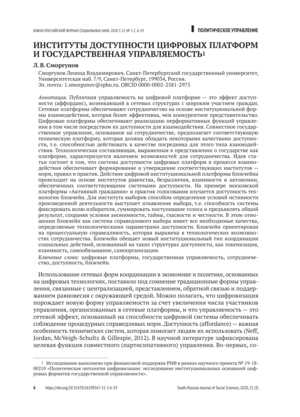Abstract
Public governability on a digital platform is the affordance effect that occurs in networks with broad citizen participation. Network platforms provide collaboration based on an institutionalized form of interaction that is more efficient than competitive representation. Digital platforms provide the implementation of performative governance functions, including through their affordability for interaction. Collaborative public governance presupposes an appropriate technical platform that must have some qualities of affordability, that is, the ability to act as an intermediary for this type of interaction. The technological component, expressed in the concept of the state as a platform, is characterized by the presence of opportunities for cooperation. The idea of the article is that the system of affordability of digital platforms in the process of interaction ensures the formation and approval of the relevant institutions — norms, rules and practices. The digital institutional platform of the blockchain operates on the basis of institutions of equality, indifference, reciprocity and autonomy, provided by appropriate affordability systems. Using the example of the Moscow platform “Active Citizen” and the practice of voting, the affordability of blockchain technology is studied. For the institution of elections, the way of determining the conditions for the truth of the performed activity is the expression of choice, i. e. the ability of the system to record the will of the voter, to summarize the votes received and to present the overall result, while maintaining the conditions of anonymity, secrecy, publicity and honesty. In this regard, the blockchain as a system of fair choice has all the necessary qualities determined by the technological parameters of affordability. Blockchain is focused on procedural fairness, which is expressed in the technological possibilities of cooperation. Blockchain promises a new institutional type of social coordination based on affordability structures such as tokenization, reciprocity, self-binding, and self-organization.
Keywords
Funding information
The research was carried out through the financial support of the Russian Scienсе Foundation, grant No 19-18-00210 “Political ontology of digitalization: Study of institutional bases for digital forms of governability”.
References
Алексеев, Р.А. (2018). Блокчейн как избирательная технология нового поколения — перспективы применения на выборах в современной России. Вестник Московского государственного областного университета, 2, 3–10.
Волкова, Н.А. (2019). Возвращение модусов существования Латура к «радикальному эмпиризму»: от препозиций к аффордансам. Социология власти, 31(2), 92–115.
Гибсон, Дж. Дж. (1988). Экологический подход к зрительному восприятию. Москва: Прогресс.
Ерохина, О.В. (2019). Технологии электронного голосования в России. Вестник университета, 11, 5–11.
Кутейников, Д.Л. (2019). Особенности применения технологий распределенных реестров и цепочек блоков (блокчейн) в народных голосованиях. Актуальные проблемы российского права, 9 (106), 41–52. DOI: 10.17803/1994–1471.2019.106.9.041–062
Латур, Б. (2020). Пересборка социального: введение в акторно-сетевую теорию. Москва: Изд. дом Высшей школы экономики.
Сигалов, К.Е., Салин, П.Б., Чувальникова, А.С. (2018). Применение технологии блокчейн в праве, политике и государственном управлении. Вестник Российского университета дружбы народов. Серия: Юридические науки, 22(4), 565–580. DOI: 10.22363/2313-2337-2018-22-4-565-580
Сморгунов, Л.В. (2018). Блокчейн как институт процедурной справедливости. Полис. Политические исследования, 5, 88–99. DOI: 10.17976/jpps/2018.05.08
Daramola, O. & Thebus, D. (2020). Architecture-Centric Evaluation of Blockchain-Based Smart Contract E-Voting for National Elections. Informatics, 16(7), 2–22. DOI: 10.3390/informatics7020016
David, A., Sobolewski, M. & Vaccari, L. (2019). Blockchain for Digital Government. An Assessment of Pioneering Implementations in Public Services. Luxembourg: Publications Office of the European Union.
Davidson, S., De Filippi, P. & Potts, J. (2018). Blockchains and the Economic Institutions of Capitalism. Journal of Institutional Economics, 14(4), 638–659. DOI: 10.1017/S1744137417000200
Eriksson, K. & Vogt, H. (2013). On self-service Democracy: Configurations of Individualizing Governance and Self-Directed Citizenship. European Journal of Social Theory, 16(2), 153–173. DOI: 10.1177/1368431012459693
Gil-Garcia, R., Dawes, S. & Pardo, T. (2018). Digital Government and Public Management Research: Finding the Crossroads. Public Management Review, 20(5), 633–646. DOI: 10.1080/14719037.2017.1327181
Gillespie, T. (2010). The Politics of “Platforms”. New Media & Society, 12(3), 347–364. DOI: 10.1177/1461444809342738
Gorwa, R. (2019). What is platform governance? Information, Communication & Society, 22(6), 854–871. DOI: 10.1080/1369118X.2019.1573914
Janowski, T., Estevez, E. & Baguma, R. (2018). Platform Governance for Sustainable Development: Reshaping Citizen-Administration Relationships in the Digital Age. Government Information Quarterly, 35, 1–16. DOI: 10.1016/j.giq.2018.09.002
Kiayias, A. et al, (2017). Ouroboros: A Provably Secure Proof-of-Stake Blockchain Protocol. Criptography ePrint Archive, 1–52.
Krenjova, J. & Raudla, R. (2017). Policy Diffusion at the Local Level: Participatory Budgeting in Estonia. Urban Affairs Review, 3(4), 1–29. DOI: 10.1177/1078087416688961
Kübler, D. Rochat, Ph., Woo, S.Y. & Heiden. N. van der. (2020). Strengthen Governability rather than Deepen Democracy: Why Local Governments Introduce Participatory Governance. International Review of Administrative Sciences, 86(3), 409–426. DOI: 10.1177/0020852318801508
Neff, G., Jordan, T., McVeigh-Schultz, J. & Gillespie, T. (2012). Affordances, Technical Agency, and the Politics of Technologies of Cultural Production. Journal of Broadcasting & Electronic Media, 56(2), 299–313. DOI: 10.1080/08838151.2012.678520
O’Brien, D., Offenhuber, D., Baldwin-Philippi, J., Sands, M. & Gordon, E. (2017). Uncharted Territoriality in Coproduction: The Motivations for 311 Reporting. Journal of Public Administration Research and Theory, 27(2), 320–335. DOI: 10.1093/jopart/muw046
O’Reilly, T. (2010). Government as a Platform. In Open Government: Collaboration, Transparency, and Participation in Practice (pp. 11–40). USA: O’Reilly Media, Sebastopol, Calif.
Santos, M. & Faure, A. (2018). Affordance is Power: Contradictions Between Communicational and Technical Dimensions of WhatsApp’s End-to-End Encryption. Social Media & Society, 4(3), 1–16. DOI: 10.1177/2056305118795876
Van Dijck, J., Poell, T. & De Waal, M. (2018). The Platform Society: Public Values in a Connective World. New York: Oxford University Press.
Wang, H.F., Wang, J.L. & Tang, Q.H. (2018). A Review of Application of Affordance Theory in Information Systems. Journal of Service Science and Management, 11, 56–70. DOI: 10.4236/jssm.2018.111006


